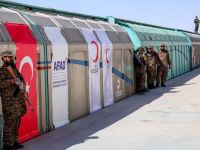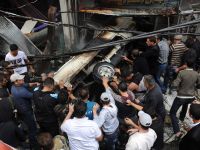By Munir K. Nasser
Chief Correspondent, Washington, DC
Albawaba.com
Leaders of 18 Arab and Muslim American organizations urged the Clinton administration to take the lead in providing international protection and to intervene to prevent any further use of disproportionate force by Israel against Palestinian civilians in the West Bank, Gaza and against Israeli Arabs.
The leaders, who met with US Assistant Secretary of State, Ned Walker on Friday, October 6, called on the State Department to look into whether or not Israel is using US made weapons in their clashes with civilians in violation of the US Arms Export Control Act.
During their meeting with Walker, the Arab American delegation deplored the failure of the US government to condemn the use of lethal weaponry, including missiles and helicopter gunships, by Israeli troops. The delegation told Walker that they regret the US government’s decision to close its embassies in the Arab world. They expressed their concern about the growing alienation on the popular level in the Arab world due to the perception of lack of balance in US policy.
The delegation handed Walker a list of recommendations calling on the Clinton administration to immediately implement the following:
1. International Inquiry: Support the demand for an international inquiry into the root causes of the conflict.
2. Protection for Palestinian Civilians: Take the lead in providing international protection for Palestinian civilians particularly in the areas of conflict and flash points.
3. Humanitarian Assistance: Provide for immediate emergency medical supplies from the US in consultation with Palestinian medical providers.
4. Palestinians Rights: Reaffirm and strengthen President Clinton’s statement in Gaza supporting Palestinian inalienable rights for self-determination in the same manner that he has recently supported Serbian people in their fight for freedom.
5. Arms Shipments: Announce a reexamination of arms shipments to Israel in light of the use of US- supplied weapons against Palestinian civilians.
Walker promised the Arab American leaders to pass the recommendations to Secretary Albright for consideration and briefed them about the latest attempts by the Clinton Administration to bring about a "cease-fire" between Israel and the Palestinian Authority.
In their meeting with the press after the meeting, Arab American leaders condemned Israel’s resort to extreme force to deal with popular Palestinian demonstrations. “It is shocking and disgraceful that in this latest round of violence, a significant number of the victims have been children,” said James Zogby, President of the Arab American Institute. “Not only should the United States use its influence to make sure that Israel abides by international law when dealing with civilian demonstrations, but we must also make sure that Israel is not using US weapons against Palestinian civilians in violation of US law," Zogby said.
In a related development, Republican presidential nominee George W. Bush met with more than 35 Arab American leaders from Michigan on Friday, October 6, and discussed with them issues of concern to the Arab American community. The leaders expressed their concern over a wide range of issues including the Middle East peace process and recent outbreak of violence, the US embassy in Israel, economic sanctions against Iraq and the use of secret evidence in deportation proceedings.
The meeting, which was hosted by Michigan Governor John Engler, followed a policy address given by Bush campaign advisor Condaleeza Rice to an Arab American audience on October 4, in Michigan. The briefing by Rice marked the first exclusive address on U.S.-Middle East policy by the Bush campaign. During that briefing, she addressed the Middle East peace process, the US Embassy in Israel, and sanctions on Iraq.
Arab American Institute Chairman George R. Salem, who participated in the meeting in his role as National Chair of Arab Americans for Bush/Cheney, noted "The fact that the foreign policy advisor to the Bush campaign chose to give her first exclusive Mideast policy address to an Arab American audience says a great deal about how the Arab American community is valued by the Bush campaign. The fact that the campaign followed that event with an exclusive meeting with the candidate himself says even more."
Michigan’s Arab American community numbers more than 350,000 and because of its high voter turnout in critical elections can represent as much as four percent of the statewide vote. More than 70 percent of Arab Americans in the Detroit metropolitan area are registered to vote and 60 percent of that community voted in the last presidential election.
According to Salem, these events signal the growing political power of the Arab American community. “We are organized. We vote in large numbers. I think the attention we are receiving from the presidential campaigns this year makes that very clear," said Salem.
© 2000 Al Bawaba (www.albawaba.com)







